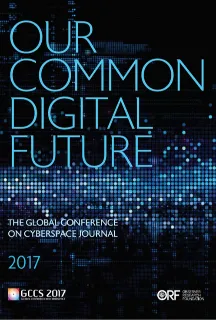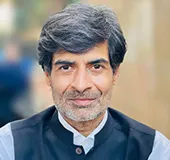For a medium considered to have revolutionised communications, it is ironic that the many struggles around the governance of cyberspace stem from a lack of communication — communication among states, between states and citizens, and between those that create technology and those that consume it. Normative processes that will determine the future of cyber governance have greatly benefited by bringing together actors who represent diverse geographical, political, economic and social realities. One of the most important among these processes is the Global Conference on Cyberspace (GCCS).
Conceived in London in 2011, the GCCS is the largest gathering of all stakeholders on cyberspace issues. It has already managed to bring into this fold key interlocutors from government, civil society, industry and academia. The fifth edition of the conference, convened by India, is a significant landmark in the evolution of the London Process. GCCS 2017 is the first time that the gathering is hosted by a non-OECD economy. This very fact leads to an opportunity for the internet community to engage with a wholly new demographic and different set of issues animating the next billion internet users. That India hosts this process now is a message in itself and augurs well for greater degree of pluralism in the agenda, grammar and ambitions of this process.
This idea is reflected in the four main pillars for GCCS 2017 — inclusion, growth, diplomacy and security. This volume of essays captures some of the critical debates on these issues from foremost leaders, visionaries, founders and young minds in technology, policy and governance. While previous editions of this conference have been designed as high-level stocktaking exercises, this edition has the potential to go a step further and create an independent norm-setting initiative led by diverse and emerging economies. The essays in this volume are intended to guide this endeavour.
The multiple goals of policymaking — providing access, securing the medium and spurring economic activity — are no longer mutually exclusive. These are all interlinked interests. There is perhaps no better example that is more illustrative of this phenomenon than the opportunity presented by digital payments. Digital payments have immense potential in promoting financial inclusion to those at the bottom of the pyramid and in banking the unbanked. It can enable micro entrepreneurship and serve as the backbone for services in the digital age. At the same time, digital transactions have sometimes come under the shadow of technological vulnerabilities and in the unsafe practices of users who make them. Governments today have to juggle policy priorities that are often at odds with each other — providing access cannot ignore concerns around security and securing the medium cannot come at the cost of stifling innovation. Reconciling these challenges in pursuit of one goal is the digital trilemma for cyberspace policymakers today.
Addressing these challenges will require policymaking that is both technologically and socially dynamic. It will require normative guidance that is targeted and yet inclusive. With formal multilateral processes such as the UN Group of Governmental Experts on Developments in the Field of Information and Communication Technologies ending in a lack of consensus this year, initiatives such as the GCCS assume more importance. The conference can serve as a forum to make the global discourse around cyberspace more representative and plural — this year we will witness some of the normative conversations begun by bodies like the Global Commission on the Stability of Cyberspace and have these ideas deliberated upon.
The essays in this volume, covering a range of topics from cyber conflict to digital connectivity, aim to bring a diversity of interests and perspectives on to the same table, in the hopes that they will guide discussions for future gatherings and maybe even answer some of the long contested issues for policymakers today.
Asia is not only home to the largest number of internet users in the world, it is also poised to lead the world in technology, innovations and regulatory policy — it is therefore only fitting that GCCS 2017 is being stewarded by India. The process will benefit from the democratic ethos of policy conversations in India and will allow voices that have remained on the sidelines to have their chance to shape our common digital future.
The views expressed above belong to the author(s). ORF research and analyses now available on Telegram! Click here to access our curated content — blogs, longforms and interviews.

 PDF Download
PDF Download



 PREV
PREV


